|
|
Post by housemouse on Sept 17, 2005 8:10:05 GMT -5
Every time I watch Up on the Roof, I have this nagging feeling about why Terry shot himself. I don't think it was so he would "get a little credit for stepping up" as he said to Jim. I think it was for sympathy. He did it so that he could figuratively say to everyone - "hey look I got shot too." Maybe it was his way of trying to show Jim and the others that he is one bad ass cop, because only a bad ass cop would take a bullet. 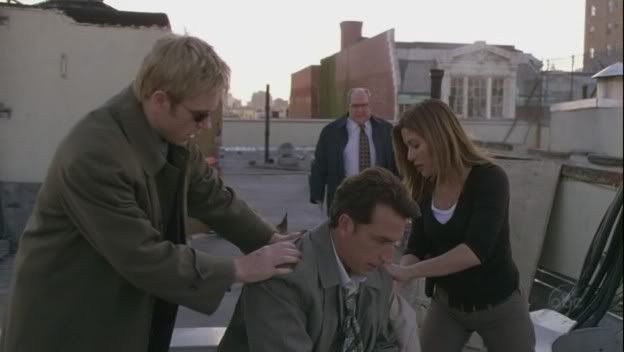 Here's Terry, the center of attention, everyone is concerned for his well being. Jim got months and months of that, now Terry wants in on the action. 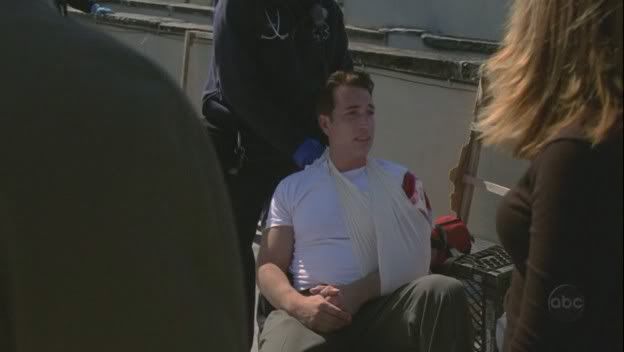 Terry is one tough guy. He can take a bullet with nothing more than a grimace. See, he is just as tough as his former partner. |
|
|
|
Post by Duchess of Lashes on Sept 17, 2005 9:17:10 GMT -5
I agree that it wasn't to get a "little credit for stepping up" - that statement was more defense based when confronted with the fact that his partner had discovered the truth. "You can't accept it" (Of course Jim would be able to accept it - Terry took a bullet to the shoulder - not a bullet to the head - nothing that would change his life situation forever - what wouldn't there be to accept?)
The one thing that we do know about Jim is that he has never wanted to be the center of attention. ("I didn't go to the press. The press got a hold of this story and they ran with it." When asked if he wants to be part of the walkout at the end of the Pilot, Jim turns it down, "No, I'm alright. But thanks though.") In Terry's mind, the attention after the shooting must have been focused on Jim, the brave cop, the fallen officer - Terry was injured too - as Galloway would say, in a different way - he was there too, he witnessed so much that day - and I get the impression that he apparently didn't get any help in reconciling the scarred emotions he carried with him because of his involvement in the "scene at the bank". ("I'll get some help." - why hadn't he sought help before then?)
It would appear to me that the reason for his actions were purely one-dimensional, although there is depth to that dimension - the attention he would garner over being a cop who got shot in the line of duty; not only the attention and sympathy of his fellow officers and the department but the fact that, in his mind, the tables are now turned and it's his turn to finally garner Jim's attention.
For so long, he has lived with the guilt of his actions (inaction), no way to reconcile that guilt with himself or with Jim. He had been trying to get Jim's attention, to try to weave his way back into Jim's life, somehow, to get Jim to tell him he was forgiven. ("Apology accepted." Jim leans back against the wall and crosses his arms - a finality to his statement. Terry reaches out to touch him and there is no reaction whatsoever - the matter is closed, finished, done.)
The fact that Jim again denies Terry the chance to talk, just briefly, before they head out to the apartment, speaks volumes. Terry is still seeking reconciliation but Jim rebuffs him, saying, "Terry, let's just do our jobs, work the case."
By shooting himself, coincidentally working a case with his former partner, he is presented with the perfect opportunity to put himself back on Jim's radar screen - never believing, of course, that Jim will discover the truth about what he has done.
One other important element that lends credence to Terry's need to be forgiven is that he and Jim were obviously close, not only partners but friends (Jim is his baby's godfather.) But the shooting changed all of that, took that element out of his life. When Jim comes to visit Terry in the hospital, Terry says, "Hey maybe we can go get a beer sometime." That line to me indicates that he is of the belief that their relationship is maybe, in his mind, anyway, on the way to being healed - the door has been opened a crack and Terry is ready to step through.
|
|
|
|
Post by shmeep on Sept 17, 2005 15:00:32 GMT -5
I love the complexity of Terry's character and what he is going through. I also love the way Jim broaches the subject with Galloway: "You deal with a lot of crazy people, don't you?" Seems clear where Jim stands on why Terry did it.
|
|
|
|
Post by mlm828 on Sept 17, 2005 16:09:50 GMT -5
I have always thought that Terry's shooting himself was not something that was consciously planned or thought out beforehand. Rather, it was impulsive or compulsive behavior. So there wasn't a reason, in the sense of some rational thought process leading up to a decision. When he saw Jim and was rebuffed by him, his guilt must have reignited and ramped up. Then, when he was alone on the roof with Titus's gun in his hand, his guilt somehow created an impulse or compulsion to shoot himself. This is not to say there wasn't an element of calculation in how he did it. There clearly was calculation in using the handkerchief and taking advantage of circumstances in which Titus could be fingered as the shooter. But this is different from planning in advance to assuage his guilt by shooting himself.
One possible theory is that Terry was acting under a compulsion or impulse similar to that seen in individuals who cut themselves. Perhaps inflicting physical pain was a way of alleviating his emotional pain, or at least distracting himself from it.
After the fact, Terry seems to think he has somehow evened the score with Jim. I watched the scenes between them in "Up on the Roof," managing to tear my eyes away from Jim. At the beginning of the episode, Terry can barely look at Jim, but after shooting himself, he is able to look at him and acts as if he has somehow equalized things between them by "being shot."
|
|
|
|
Post by maggiethecat on Sept 17, 2005 19:10:41 GMT -5
One possible theory is that Terry was acting under a compulsion or impulse similar to that seen in individuals who cut themselves. Perhaps inflicting physical pain was a way of alleviating his emotional pain, or at least distracting himself from it. After the fact, Terry seems to think he has somehow evened the score with Jim. I watched the scenes between them in "Up on the Roof," managing to tear my eyes away from Jim. At the beginning of the episode, Terry can barely look at Jim, but after shooting himself, he is able to look at him and acts as if he has somehow equalized things between them by "being shot." I love your take on things, mlm88, and I am intrigued by your "cutting" theory, which implies an unbearable amount of psychic pain, and certainly more than a little desperation. "Jimmy," he cries out by the river,"what would make a man shoot himself in the arm?" Good question. Consider how many times Terry has been rebuffed -- given the cold shoulder -- by Jim the morning they meet on the double homicides. Jim is (understandably) stiff with Terry on the street, so much so that Marty, arguably not the most sensitive of souls, asks him, "Why the bad blood?" (Interesting as well that Terry asked Fisk to check with Jim about whether there would be a problem with the two of them working together.) The scene in the squad room, when Terry tries to make friendly overtures to Jim, and is met with, "Let's just work the case." And they're off to Rivington Street. Terry keeps trying with Jim, doesn't he? He's so naked in his need, so pathetic. He's looking for forgiveness, for expiation, for the kind of redemption only Jim can give him. How screwed up is this man that he's looking to the man he blinded for what Housemouse so aptly called "a rope out of the abyss?" Maybe the only way Terry can get a response out of Jim -- whether it's pity or admiration for "stepping up" -- is to be himself, wounded. |
|
|
|
Post by mlm828 on Sept 17, 2005 19:26:47 GMT -5
And it works, at least at first. When Jim arrives on the roof and learns Terry has been shot, he appears to be genuinely concerned about him.
It may be that shooting himself -- hurting himself physically -- is a way for Terry to say to Jim, "I'm hurting, too."
|
|
|
|
Post by hoosier on Sept 19, 2005 17:58:24 GMT -5
It wasn't planned--there was the means(Titus' gun) and the opportunity (alone). Why did he do it? Guilt over the bank,he failed on the roof like he failed at the bank,he was rejected by Jim? All of the above??? He has rationalized that he is a good cop, that he isn't a coward no matter what Jim thinks. He wants to prove his worth to Jim and to himself. In another post, I wondered if he did it solely because Jim was present. He would have had no reason to do it if he wasn't in my opinion.  |
|
|
|
Post by housemouse on Sept 19, 2005 18:01:24 GMT -5
It wasn't planned--there was the means(Titus' gun) and the opportunity (alone). Why did he do it? Guilt over the bank,he failed on the roof like he failed at the bank,he was rejected by Jim? All of the above??? He has rationalized that he is a good cop, that he isn't a coward no matter what Jim thinks. He wants to prove his worth to Jim and to himself. In another post, I wondered if he did it solely because Jim was present. He would have had no reason to do it if he wasn't in my opinion.  Whether he would have done it with or without Jim there is an interesting question. Had Jim not been there he surely would have heard about the incident. As it turns out, if Jim hadn't been involved in it, it would probably have worked out much better for Terry. |
|
|
|
Post by hoosier on Sept 22, 2005 17:54:19 GMT -5
If Jim had not been there, what would have mean Terry's motive for shooting himself??? Jim was the catalyst. If he hadn't of been there and Terry went ahead and did the deed, Titus would have been in prison. No one would have noticed the gun firing sequence--Karen was present and she certainly didn't notice it. Terry would have had nothing to prove to anyone else whatever his reasoning for doing it. Only Jim.
|
|
|
|
Post by housemouse on Sept 30, 2005 17:06:36 GMT -5
If Jim had not been there, what would have mean Terry's motive for shooting himself??? Jim was the catalyst. If he hadn't of been there and Terry went ahead and did the deed, Titus would have been in prison. No one would have noticed the gun firing sequence--Karen was present and she certainly didn't notice it. Terry would have had nothing to prove to anyone else whatever his reasoning for doing it. Only Jim. I wonder if Jim would have heard about Terry's heroism in taking a bullet. That would probably have been much better for Terry. It might have restored Jim's faith in Terry's ability to "step up." Why, you might ask, would Terry pick this time to do the deed if Jim had not been there? I would theorize that seeing Jim back on the job a year after the shooting, and having the reality of what happened to Jim hit Terry square in the face, stirred up all the old memories and self-doubt Terry had been suppressing for the last year. |
|
|
|
Post by Kasman on Sept 2, 2006 8:07:25 GMT -5
There's one other issue here. There's the fact that Terry was obviously on a downward spiral - he had, at this point in time, been partnered with a man who would be considered a has-been - an overweight, fool of a detective who was obviously close to retirement. It's possible he took shooting himself on that rooftop as his way out, as well as being a way of saying, "Hey, I'm a big man, I got shot too". Certainly it got Jim's attention and, for a while, Jim was able to overlook the events at the bank until he started to put it all together. The fact that Terry shoots himself could also fall within the realms of attention-seeking behaviour related to Munchhausen Syndrome. See the definition under The Sufferer here for more information. Whatever way you look at it, Terry was crying out for help. |
|
|
|
Post by mlm828 on Sept 2, 2006 15:25:41 GMT -5
There's one other issue here. There's the fact that Terry was obviously on a downward spiral - he had, at this point in time, been partnered with a man who would be considered a has-been - an overweight, fool of a detective who was obviously close to retirement. It's possible he took shooting himself on that rooftop as his way out, as well as being a way of saying, "Hey, I'm a big man, I got shot too". Certainly it got Jim's attention and, for a while, Jim was able to overlook the events at the bank until he started to put it all together. The fact that Terry shoots himself could also fall within the realms of attention-seeking behaviour related to Munchhausen Syndrome. See the definition under The Sufferer here for more information. Whatever way you look at it, Terry was crying out for help. More discussion of "Up on the Roof" -- yes!I agree there is an attention-seeking aspect to what Terry did. Jim clearly doesn't want to deal with him, and this is a way of getting not only Jim's attention, but favorable attention from Jim and others. It may also be a way of seeking validation that he's still a good cop. If he was thinking rationally, he'd know he wasn't going to get that from Jim. But it has also been suggested that Terry ended up partnered with Glen, because people suspected something wasn't quite right in his story about what happened at the bank. So this could also have been a way of seeking validation from the NYPD and his fellow cops. The concept that Terry was looking for a way out is absolutely fascinating. His self-inflicted injury was not serious enough to take him off the job. Do you mean he wanted subconsciously to be caught? Could be. He could have wanted to be caught, because he could no longer keep up the pretense necessary to continue being a cop. Or maybe he wanted to be caught, because he was caught in the middle, between his guilt and his inability to bring himself to admit his failure at the bank. If that's the case, however, he doesn't even accomplish that. The only person he ends up confessing to, indirectly, is Jim ("Do you know what can make a man shoot himself in the arm? I do.") |
|
|
|
Post by maggiethecat on Sept 2, 2006 17:39:29 GMT -5
The fact that Terry shoots himself could also fall within the realms of attention-seeking behaviour related to Munchhausen Syndrome. This might be an interesting or even valid interpretation if we had any evidence that Terry was seeking attention, or was given to the sort of fanciful and pathological lying that is part and parcel of Munchausen's, before the shootout at the bank. We don't. Even Jim admits that prior to that day Terry was a good cop and a friend. 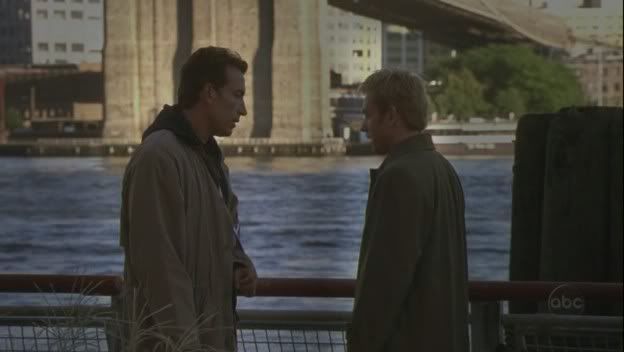 Honestly? I have a hard time imagining Jim Dunbar putting up with a partner who was a bold-faced liar or an egregious attention-seeker for three years. Terry's shooting himself is rooted in, and springs from, one specific event: the shootout at the bank. It all goes back to the moment when he froze, which was for Terry as much of a defining and life-altering event as it was for Jim. If Terry was seeking attention from anyone it was from his former partner, who had ducked his calls for a year, only allowed him to apologize when he was literally cornered into it . . . 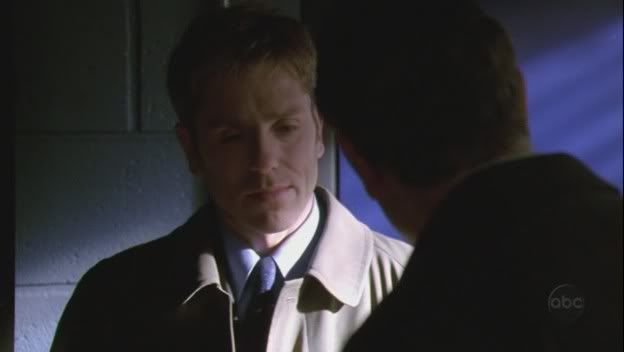 . . . and who wanted to keep things on a purely professional footing. "Let's just work the case," says Jim, although Terry wants more then Jim is willing, or able, to give: understanding, expiation, a beer at the end of the day. It's the way in which Jim shuts Terry out -- his chilly, impersonal demeanor -- that exacerbates Terry's desperation and sets off what follows. As for Terry's wanting to be "caught," thus effectively ending his career with the NYPD, I don't buy it. Do we have any indication that Terry no longer wants to be a cop? As intriguing as this may be as an hypothesis, when Jim confronts him at the river, Terry fights tooth and nail to stay on the job. He doesn't even back down after being shown the handkerchief, instead offering to go for counseling -- a hollow offer since it's obvious he's only using it as a last ditch bargaining chip. And, judging by his expression, Jim doesn't buy it any more than we do. 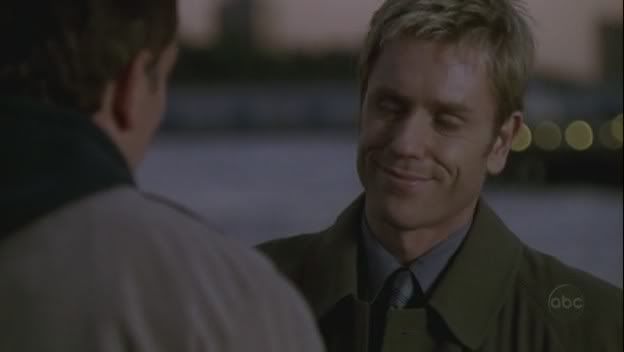 Clearly, Terry knows that the truth of the shooting will end his days on the force: Clearly, he does all he can to keep this from happening, bargaining and pleading and playing every emotional card in his pitiful arsenal. Bottom line? Terry shot himself so he'd look like a big old first-through-the-door hero cop who'd been wounded in the line of duty. Not because he had a rare psychological disorder. Not because he wanted to end his career with the NYPD and chose a tortuous and devious path instead of just going down to One Police Plaza and putting in his papers. Wheezing old gasbag he may have been, but Glen Semple called it when he said Terry "wants to look like a hero." Like Jim Dunbar.  \ 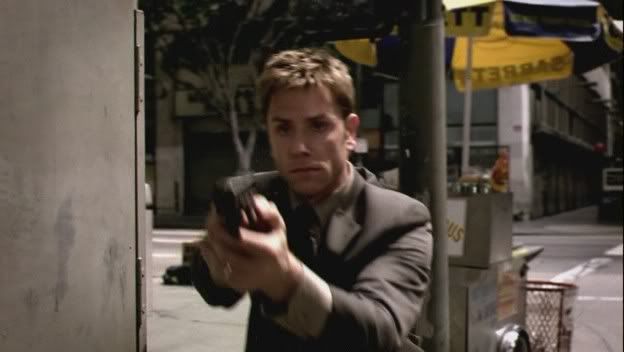 |
|
|
|
Post by Kasman on Sept 2, 2006 21:28:38 GMT -5
Actually, my thinking is that the attention-seeking came AFTER the bank. I agree, Dunbar would not put up with three years of an attention-seeking, lying partner.
|
|
|
|
Post by maggiethecat on Sept 3, 2006 6:29:03 GMT -5
Actually, my thinking is that the attention-seeking came AFTER the bank. I agree, Dunbar would not put up with three years of an attention-seeking, lying partner. I was responding to your suggestion about Munchausen's Syndrome, which, if germane, would have had to have been a part of Terry's personality for some time. |
|